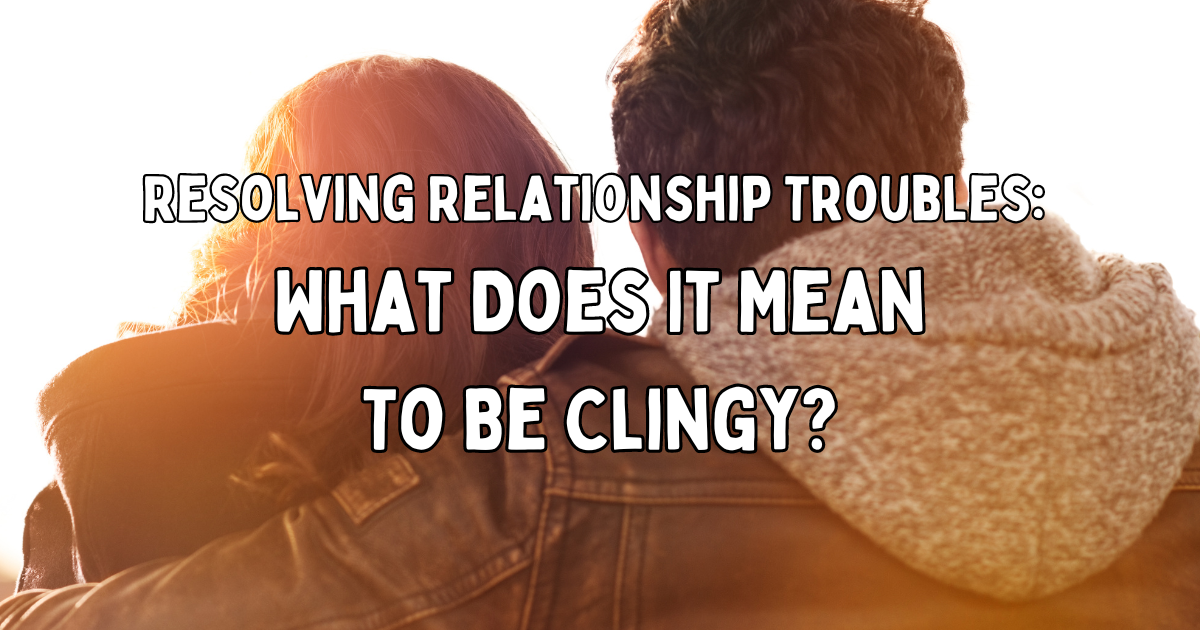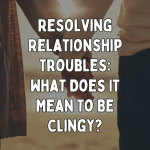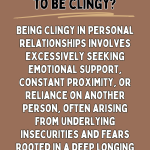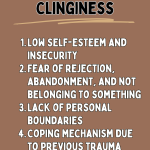What does it mean to be clingy? Well, we all know the label “clingy” and the negative connotations it carries. It’s often used to describe someone who may seem overly dependent, possessive, and suffocating in a relationship. But let’s take a moment to put ourselves in their shoes and truly understand what it means to be clingy. Behind this behavior lies a story of deep-seated insecurity and a genuine longing for love and connection that deserves compassion. The impact of clinginess on relationships is undeniable. It can strain personal freedom and space, creating tension and unease.

That’s why it’s important to address clinginess directly, not by judgment, but by understanding and acknowledging its underlying causes. By doing so, we can work towards cultivating healthier and more satisfying relationships, where trust, mutual respect, and personal growth thrive. Let’s replace judgment with empathy and support, creating a nurturing environment where both partners can thrive and find lasting happiness together. You can take a look at the inspirational and success quotes to broaden your self-improvement journey.
What Does It Mean To Be Clingy?

The term “clingy” encompasses various meanings depending on the context in which it is used. In personal relationships, it typically describes an individual who displays an excessive need for emotional support, constant proximity, or reliance on another person. This behavior stems from a deep longing for connection and security, often rooted in underlying insecurities and fears.
Picture a person who craves the closeness and reassurance of a loved one, seeking an emotional anchor to navigate life’s challenges. It’s like a tight embrace, hoping to find solace and comfort in the presence of someone trusted. Beyond relationships, “clingy” can also describe something that adheres tenaciously, like clingy material or clothing that clings tightly to the body.
In both cases, the term “clingy” conveys a sense of attachment, be it emotional or physical, highlighting the complexities of human connections and the diverse ways individuals seek support, comfort, and intimacy.
5 Main Causes Of Clinginess
Low self-esteem and insecurity

Your childhood experiences shape your self-esteem and impact how you perceive your own value. If your needs were consistently unmet, you may have internalized a belief that you are insignificant, carrying this feeling into adulthood as a fear of abandonment. This fear of rejection can fuel clinginess and a constant need for validation.
Clinginess serves as a defense mechanism against the anticipated rejection you fear, rooted in feelings of insecurity. To break free from this cycle, it is important to address your insecurities, nurture your self-worth, and cultivate healthier patterns in your relationships. This can be achieved through self-reflection, therapy, and practicing self-care to develop a stronger sense of self.
Here are some symptoms of low self-esteem to watch out for:
- Clinging onto others and feeling burdensome
- Difficulty establishing personal boundaries
- Engaging in controlling behavior or allowing others to control them
- Experiencing unexplained shame
- Persistent self-perception of flaws or problems
- Desire to remain unnoticed and avoid taking up space
- Feeling indebted to others
- Apologizing frequently
- Decreased self-esteem
Fear of rejection, abandonment, and not belonging to something

Insecurity stemming from past experiences of abandonment and rejection can profoundly affect you. Whether your caregivers were unresponsive, preoccupied, uncaring, or physically absent, you may have internalized a deep belief that you are unlovable and destined to be left behind. This fear continues into adulthood, causing you to go to great lengths to please your partners, often neglecting your own needs, emotions, and desires. When faced with the possibility of abandonment or rejection, you experience intense emotional distress.
Conflict, trust issues, and poor communication can heighten your fear of being alone and reinforce anxieties. Others must offer empathy and understanding, acknowledging the impact of your past experiences on your current fears and behaviors. Building trust, fostering open communication, and creating a safe environment are essential for healing and developing healthier relationship patterns. Remember, healing is possible by addressing insecurities and embracing your self-worth, leading to more fulfilling connections.
Lack of personal boundaries

When answering the question “what does it mean to be clingy?” it’s important to know that trauma and mistreatment in early life can lead to low self-esteem. Moreover, it also leads to an uncertain sense of self, making it difficult to assert yourself and set personal boundaries. This can lead to challenges in understanding and respecting the boundaries of others, leading to clingy behavior such as excessive calling, invading privacy, or not allowing personal space.
Weak boundaries also often cause you to prioritize the feelings and needs of others over your own, triggering a fear of being abandoned or rejected if your partner is unhappy. Acknowledging the impact of your past experiences and the struggles posed by weak boundaries is a crucial step toward personal growth. Through self-reflection, therapy, and self-care, you can develop a stronger sense of self-worth, establish healthier boundaries, and cultivate more balanced and fulfilling relationships.
Coping mechanism due to previous trauma

Clinginess, rooted in intense relationship anxiety, is an “emotion-focused” coping strategy that prioritizes emotional reactions over logical problem-solving. Unfortunately, this approach can give rise to unhealthy behaviors like rumination, which further intensify the attachment system. Known as a “hyperactivating” strategy, clinginess involves actions intended to restore unity, sometimes manifesting as controlling or aggressive behaviors.
While individuals with an anxious attachment style employ clinginess to avoid abandonment, it often exhausts and frustrates partners, hindering the desired outcome. Recognizing clinginess as an anxiety-driven coping mechanism is crucial. By exploring healthier strategies like effective communication, self-soothing techniques, and enhancing self-confidence, you can cultivate more secure and fulfilling relationships. Cultivating self-awareness and seeking support are essential to break free from the cycle of clinginess and foster healthier attachment patterns.
Attachment anxiety

Clinginess typically originates from an anxious attachment style, associated with low self-esteem, a fear of abandonment, blurred boundaries, and emotional dependence. As a result, individuals become reliant on others for validation and support, always alert for signs of abandonment. This hypervigilance carries into adulthood, driving anxiously attached individuals to seek profound connections and invest heavily in relationships, craving both physical and emotional closeness.
Approaching them with empathy and understanding acknowledges the impact of their past experiences and supports their journey toward healing. Building trust, fostering open communication, and creating a safe environment are essential for cultivating more fulfilling connections. Embracing self-worth and growth paves the way for a brighter future filled with meaningful relationships.
Discovering the path to transforming turbulent, passionate love into a positive force that enriches not only your life but also the lives of your partners involves three key strategies. Here are three effective ways to manage clinginess in a relationship:
How To Manage Clinginess In A Relationship

Establish a solid foundation of attachment
Imagine yourself in a secure and nurturing relationship, whether with your current or future partner. Replace negative thoughts with envisioning favorable outcomes in your romantic connections. This shift in mindset can profoundly improve your love life.
Lean into healthy coping mechanisms
To manage clinginess in relationships, develop coping mechanisms for daily stress. Cultivate resilience by adopting strategies to confront stressors and alleviate overwhelming emotions. Taking proactive steps to address and manage stress enhances emotional well-being. Plus, it strengthens relationships by fostering independence and self-assurance.
Openly communicate with your partner
Discussing your feelings calmly reassures you of their care and provides insight into your triggers. Despite challenges, anxiously attached individuals can still experience intimacy and care deeply for their partners, just like those with a more secure attachment style.
Helping You Learn What Does It Mean To Be Clingy
In the pursuit of love, it is important to recognize the difference between the sweaty-palmed, anxiety-inducing feelings often associated with clinginess and the calmness that true love inspires. While your partner can provide support, it is unrealistic to expect them to offer total security and certainty. The most crucial relationship you can cultivate is the one with yourself.

As you work towards developing secure attachment and healthy emotional regulation, you will embrace a mindset that encourages growth and embraces life’s ever-changing nature. Your journey will involve not only finding a partner who can navigate life’s twists and turns with you but also fostering self-growth and self-assurance. Remember, true love complements, rather than consumes, allowing both partners to thrive together.
If you loved learning about what does it mean to be clingy, take a look at these self-improvement blogs:
- 23 Family Love Quotes To Bring The Entire Clan Closer
- Boost Your Confidence: 20+ Body Positivity Affirmations To Practice
- Stress-Reducing Techniques to Restore Balance in Your Life
- 23 Patience Quotes for Resilience in a Fast-Paced World
- Breaking Career Plateaus: How Online Degrees Can Boost Careers – 27/08/2025
- The Rise of Financial Micro-Decisions – 27/08/2025
- How to Stop Self-Sabotaging: 9 Ways to Break Free for Good – 25/08/2025











Leave a Reply